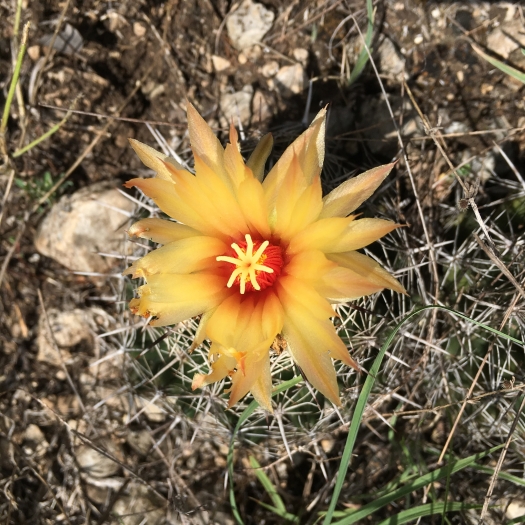Pineapple Cactus
(Coryphantha sulcata)
Pineapple Cactus (Coryphantha sulcata)
/
/

Casey Cowan
Public Domain
Image By:
Casey Cowan
Recorded By:
Copyright:
Public Domain
Copyright Notice:
Photo by: Casey Cowan | License Type: Public Domain | License URL: http://creativecommons.org/publicdomain/zero/1.0/ | Rights Holder: Casey Cowan | Publisher: iNaturalist | Date Created: 2017-07-04T11:49:29-07:00 |



















































Estimated Native Range
Summary
Coryphantha sulcata, commonly known as Pineapple Cactus, is an evergreen succulent native to the arid and semi-arid regions of Texas and Northeast Mexico, where it thrives in desert scrub and rocky outcrops. It is a small, globular cactus typically reaching a height and width of approximately 0.3 feet (0.09 meters) and 0.7-1 feet (0.2-0.3 meters), respectively. The Pineapple Cactus is characterized by its ribbed, green stems covered in spines and its ability to store water to survive drought conditions. During the summer months, it produces vibrant yellow flowers that are quite showy against the green of the cactus, adding a splash of color to the landscape.
The Pineapple Cactus is valued for its drought tolerance and unique appearance, making it a popular choice for rock gardens, xeriscaping, and as a container plant for patios and indoor settings. It requires minimal maintenance and is an excellent plant for gardeners looking to add texture and interest to dry, sunny areas. When cultivating Coryphantha sulcata, it is essential to provide conditions that mimic its native habitat, including full sun exposure, very low to low water requirements, and well-draining soil to prevent root rot. While it is generally free from serious pests and diseases, overwatering can lead to problems such as rot. It is also important to protect it from excessive moisture during the winter months.CC BY-SA 4.0
The Pineapple Cactus is valued for its drought tolerance and unique appearance, making it a popular choice for rock gardens, xeriscaping, and as a container plant for patios and indoor settings. It requires minimal maintenance and is an excellent plant for gardeners looking to add texture and interest to dry, sunny areas. When cultivating Coryphantha sulcata, it is essential to provide conditions that mimic its native habitat, including full sun exposure, very low to low water requirements, and well-draining soil to prevent root rot. While it is generally free from serious pests and diseases, overwatering can lead to problems such as rot. It is also important to protect it from excessive moisture during the winter months.CC BY-SA 4.0
Plant Description
- Plant Type: Succulent
- Height: 0.3-0.3 feet
- Width: 0.7-1 feet
- Growth Rate: Slow
- Flower Color: Yellow
- Flowering Season: Summer
- Leaf Retention: Evergreen
Growth Requirements
- Sun: Full Sun
- Water: Very Low, Low
- Drainage: Fast
Common Uses
Deer Resistant, Drought Tolerant, Low Maintenance, Showy Flowers
Natural Habitat
native to the arid and semi-arid regions of Texas and Northeast Mexico, where it thrives in desert scrub and rocky outcrops
Other Names
Common Names: Finger Cactus
Scientific Names: , Coryphantha sulcata, Coryphantha sulcata var. sulcata, Coryphantha obscura, Mammillaria calcarata, Coryphantha roederiana, Coryphantha speciosa, Cactus calcaratus, Cactus kotschoubeyi, Cactus scolymoides var. sulcatus
GBIF Accepted Name: Coryphantha sulcata (Engelm.) Britton & Rose